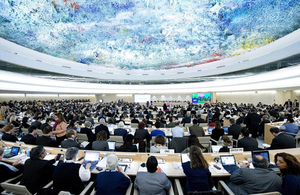UK Statement at the Panel on Remotely Piloted Aircraft Systems (RPAS), Human Rights Council, Geneva
Statement delivered by the UK on 22 September 2014 in which the UK reaffirms its position on RPAS.

The Human Rights Council is meeting from 8 to 26 September in Geneva
Mr President,
While the UK voted against the HRC Resolution in March on the use of armed Remotely Piloted Aircraft Systems (RPAS), we accept the decision to hold this panel and appreciate the opportunity for discussion.
We reiterate the support given in our explanation of vote in March, for the HRC being able to discuss the human rights implications of countering terrorism and we place on the record again our thanks for the role played by the Special Rapporteurs Emmerson and Heynes in examining these issues. However, we also continue to believe that the Human Rights Council is not the appropriate forum to discuss weapons on a thematic basis.
The UK’s position on RPAS is clear. In our foreign relations, and particularly regarding the potential use of military force, the UK acts within the letter and spirit of applicable international law, and expects others to do so too. This applies to RPAS as to any other military asset or weapon.
The UK expects other States to act lawfully in accordance with the applicable legal framework including when using RPAS against terrorist targets. If armed RPAS were to be used outside the scope of an armed conflict, their use must be in accordance with international human rights law. Adherence to these values stands in stark contrast to the daily atrocities committed by terrorists, who as we have been reminded by the actions of ISIL and the Al-Nusrah Front in Syria and Iraq, kill, rape, maim and torture indiscriminately to spread fear amongst communities. Yet we cannot, and should not let our standards drop as we combat the scourge of international terrorism.
While RPAS are a relatively new military asset, the potential of which is still to be fully realised, the existing strict legal framework at the international level is fully capable of ensuring that they are used lawfully in appropriate circumstances. RPAS are not by their nature an indiscriminate weapon and nor are they more likely to cause civilian casualties than other military options. Indeed, as the Special Rapporteur Ben Emmerson cited in his interim report in October 2013, the opportunity to inspect a target before deciding to attack it creates the opportunity for RPAS fire to be more discriminate and reduce the risk.
In summary, we do not need to rewrite the laws of war in order to be confident that, when used in such lawful circumstances, RPAS operate in the same legal environment as other military means. On the contrary, their capabilities allow for a more considered approach to battlefield decision-making that can and will save lives.
Thank you Mr President